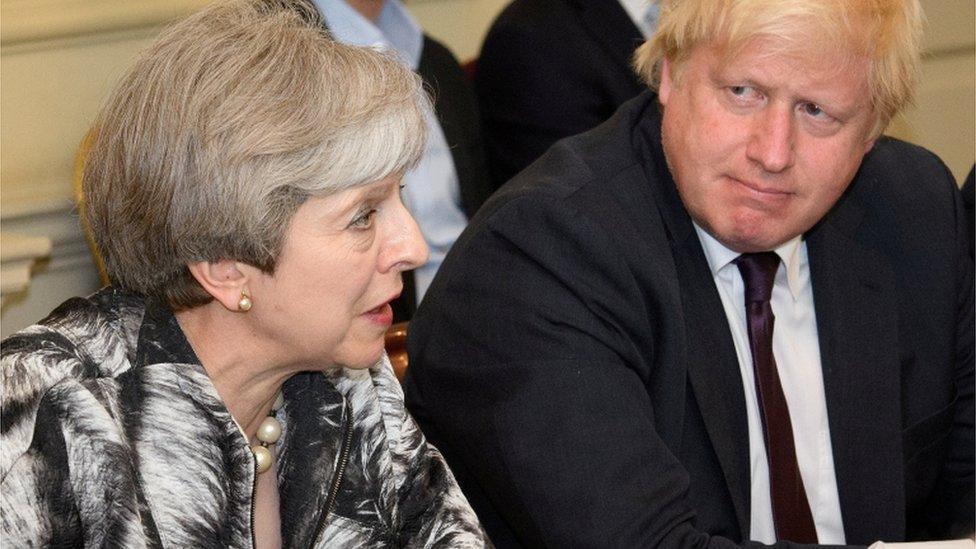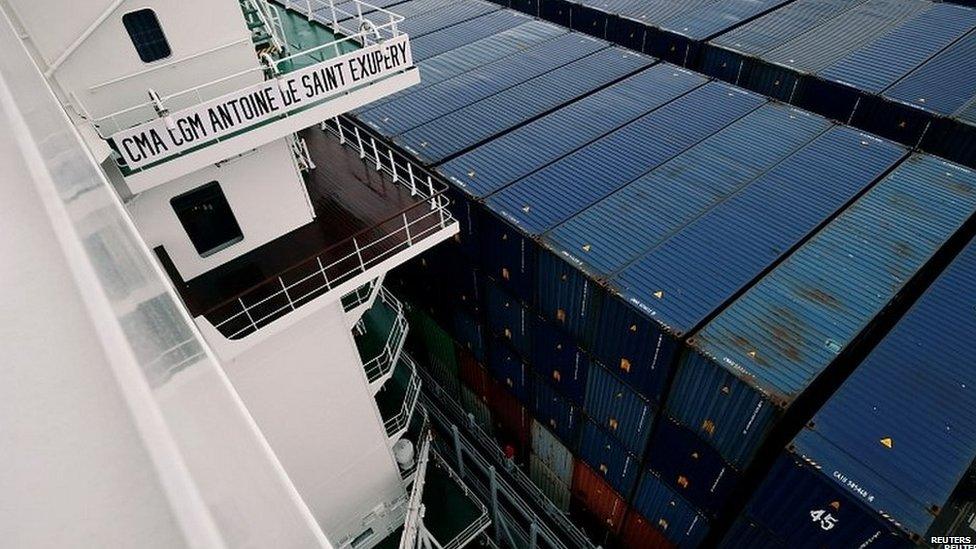Boris Johnson sets out his 'Super Canada' Brexit plan
- Published
- comments

Boris Johnson left the government over Mrs May's Chequers plan
Boris Johnson has set out his own plan for Brexit, arguing that the UK should "chuck Chequers" and negotiate a "Super Canada" free trade deal instead.
The ex-foreign secretary, who quit over Theresa May's Chequers Brexit plan, called her strategy "a moral and intellectual humiliation".
He said his vision would not lead to a hard Irish border, with any checks carried out away from the crossing.
But environment secretary Michael Gove urged the party to unite behind the PM.
And ex-attorney general Dominic Grieve, who backs a new referendum on Brexit, told the Evening Standard up to 40 Tory MPs were prepared to vote against any Canada-style deal if Mrs May ultimately opted for it.
BBC deputy political editor John Pienaar said Mr Johnson's 5,000 word article, published two days before the start of the Conservative Party conference, was a reminder that the PM's plan had very little support in the party and it was going to be a difficult week for her in Birmingham.
The UK is due to leave the EU on 29 March 2019. The two sides are seeking to negotiate the terms of exit, as well as an outline agreement on future cooperation. Parliament is to vote on any withdrawal deal.
In an article for the Telegraph, external entitled "a better plan for Brexit", Mr Johnson wrote there had been a "collective failure of government, and a collapse of will by the British establishment, to deliver on the mandate of the people".

Manufacturers say their complex cross-border supply chains are being put at risk
He said the Chequers proposals - which would keep the UK closely aligned with the EU in trade in goods - represented "the intellectual error of believing we can be half-in, half-out" of the EU.
UK firms would be exposed to EU regulations that could disadvantage them, and free trade deals would be made more difficult.
This, he said, was a "democratic disaster" and would "cheat the electorate" if implemented.
He proposed a looser free trade agreement, "at least as deep as the one the EU has recently concluded with Canada".
Canada's deal with the EU, signed in 2016, removes the vast majority of customs duties on EU exports to Canada and Canadian exports to the EU.
Mr Johnson said a Super Canada deal would involve:
"Zero tariffs and zero quotas" on all imports and exports
Mutual recognition agreements covering UK and EU regulations to ensure "conformity of goods with each other's standards"
Technological solutions to keep supply chains operating smoothly
A deal covering goods as well as services
Mr Johnson argued that it should be "relatively straightforward" to negotiate membership of the EU's aviation area while there should be a process for recognising each other's rules and regulatory standards and a dispute mechanism system in which neither side's institutions had power over the other.
He also said cooperation between the UK and EU would be closer on areas such as security and defence.

Analysis
By BBC Reality Check correspondent Chris Morris
Any kind of free trade deal based on the Canada model - super or otherwise - would make the UK more distant economically from the EU.
It would be a cleaner break, but it would also create more friction in trade, including border checks where there are currently none.
Goods coming from Canada into the EU market can be subject to a variety of checks - to make sure customs declarations are filled in correctly, to check product standards or VAT payments and to ensure the safety of food and animal imports.
New technology can help make things run more smoothly, but it's the prospect of the UK having to go through the same processes, for the huge volume of trade done with its European neighbours, which makes many businesses nervous.


On the issue of Northern Ireland, Mr Johnson said any "extra procedures" could be carried out away from the border with Ireland.
Conservative Brexiteers welcomed the intervention, saying it was the right way forward for the UK.
But No 10 emphasised there would be no withdrawal deal without a legally binding "backstop" on Northern Ireland, something it said Mr Johnson accepted when he backed December's stage one agreement.
WATCH: Lord Howard backs Canada-style deal
And Mr Gove, who worked alongside Mr Johnson in the 2016 Leave campaign, said he continued to believe Mrs May had the right formula for leaving the EU.
"I agree with the prime minister," he said. "I think the prime minister is doing a great job. I think it is really important that we unite as a party."
But Labour said the Conservatives had "run out of ideas" and were consumed by "internal warfare" while the Lib Dems labelled the article a "half-baked, sloppy rant".
What will become of the Irish border when the UK leaves the European Union?
Manufacturers' organisation, the EEF, said a Canada-style deal would require billions to be spent on new technology and infrastructure in the UK and the continent, which would take years to bed in.
"As a result, it would put thousands of manufacturing jobs and hundreds of billions of pounds of exports at risk and, at worst, could destroy much of Britain's manufacturing base," said its chief executive Stephen Phipson.
"Having been to Canada I know a customs model built around this is naïve and unrealistic as a short-term solution."
Mrs May set out her proposals on the key issue of future trade with the EU after a Chequers summit in July.
It has been fiercely criticised by some Brexiteers, who say her plans for a "common rulebook" on goods would compromise the UK's sovereignty. Up to 40 Tory Brexiteers have said they will oppose her plan if it comes to a vote in Parliament.
Mrs May has dismissed previous suggestions that checks could be carried out away from the border between Northern Ireland and the Republic of Ireland, insisting that any system of checks was "still a hard border".